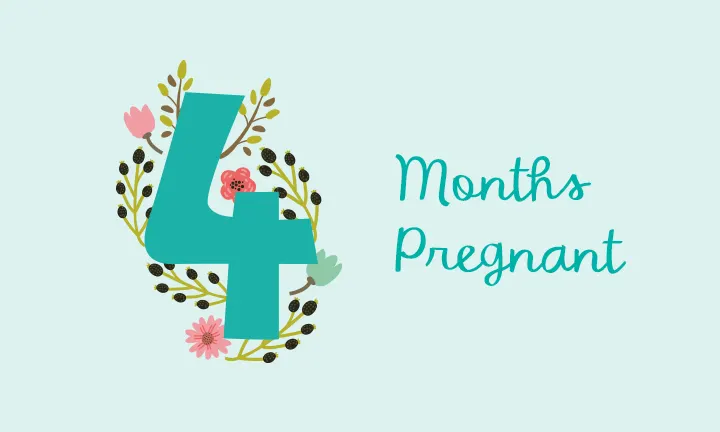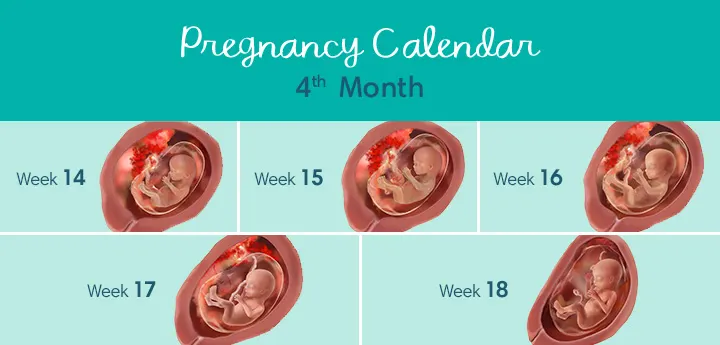4 Months Pregnant
Four months pregnant is kind of a big deal. Lots of exciting milestones occur this month—not least of which is that you are now entering the second trimester. Read on to find out more about symptoms you may experience at 4 months pregnant and how your baby is developing this month, plus see our checklist on the kinds of things to take care of in the coming weeks.
Common Pregnancy Symptoms at 4 Months Pregnant
Although you might not experience all of them, these are some of the more common pregnancy symptoms at 4 months pregnant:
Food cravings. Pickles and ice cream, anyone? Go ahead and indulge your cravings within moderation, but don’t neglect your overall balanced pregnancy diet. If you feel the urge to eat non-food items, like chalk, dirt, or laundry detergent, don’t give in to these cravings. Instead, consult your healthcare provider, as this could be a sign of a condition called pica.
Dull or sharp abdominal pain. As your uterus grows during pregnancy, the ligaments supporting it stretch. This can cause lower abdominal pain that can feel either dull or sharp. You may start experiencing this abdominal pain at 4 months pregnant. Some moms-to-be find that changing positions helps ease round ligament pain.
Sensitive teeth and gums. If your gums are swollen or if they bleed when you brush or floss, it could be gingivitis, a type of gum disease. Pregnancy hormones can make you more susceptible to gingivitis, and you may find that your gums are more sensitive than usual. To relieve some of the discomfort, brush with a soft bristled toothbrush twice a day, rinse with warm salt water as necessary, and see your dentist at your regular six-month checkup or sooner if needed.
Spider veins. These thin, reddish or purple-toned veins on the surface of the skin on your face or legs are a less severe version of varicose veins. Changes in circulation during pregnancy due to your increased blood volume can cause this symptom. Spider veins usually fade on their own after you give birth.
Stretch marks. At 4 months pregnant, these reddish, brown, or purplish streaks can start to appear on your belly, breasts, buttocks, or thighs as your skin stretches during pregnancy. It’s not possible to prevent them but keeping your skin moisturized can help reduce irritation and itchiness during pregnancy. These marks often fade over time after your baby is born.
Nasal congestion. Is your nose feeling a little stuffed up, or are you getting the occasional nosebleed? The extra blood volume in your body and hormonal changes can cause nasal mucus membranes to swell and bleed. If this is a problem for you, make sure you’re staying hydrated, and try saline nasal drops to help relieve congestion. You can also use a humidifier in your bedroom at night and apply petroleum jelly to your nostrils.
Painful urination. If you feel a burning sensation when you pee, you may have a urinary tract infection, or “UTI” for short. This happens when bacteria enter the urethra. Moms-to-be are more susceptible to UTIs because the growing uterus puts pressure on the bladder, making it more difficult to completely empty the bladder. If leftover urine contains bacteria, a UTI can develop. A UTI can become a more serious bladder or kidney infection if left untreated, so if you notice painful urination (sometimes even combined with back pain and fever), see your healthcare provider.
Vivid dreams. Experiencing weirder or more vivid dreams during pregnancy is normal, and can be chalked up to hormonal shifts, changes in your sleep patterns, and stress.
How Is Your Baby Developing This Month?
Though still quite small, your baby is already developing facial features and is also working on certain movements, like flexing the arms and legs and clasping hands into fists. When you’re 4 months pregnant, there’s still plenty of room for your baby to move around within the amniotic sac, so your little one is probably making the most of it.
At this point in your pregnancy, your little one is also starting to produce estrogen and testosterone, and genitals may be visible if you have an ultrasound exam at 4 months or a little later.
There’s more! Your baby can now swallow amniotic fluid, which means the kidneys are starting to produce urine.
And did you know that your little one is starting to hear sounds from the outside world? If you haven’t already, start talking, reading, and singing to your tiny, but very appreciative audience!
How Big Is Your Baby When You’re 4 Months Pregnant?
By the end of this month, your little one could measure about five inches long and weigh close to five ounces.
What Does a Fetus Look Like at 4 Months?
Check out these illustrations for a glimpse at what your baby might look like when you’re four months pregnant:
4 Months Pregnant: Your Body’s Changes
At 4 months pregnant, you’ve now entered the second trimester. This stage is often considered to be the “honeymoon” period of pregnancy—a time when many moms-to-be experience an energy boost.
If you’re feeling a little more energetic, why not use this trimester to take on some decorating, shopping, traveling, and any other preparations that require more effort and stamina?
You might be feeling great for other reasons, too. The nausea you may have experienced in the first trimester may have gone away by now, and your appetite may be back, making you feel a bit more like your old self.
You can also breathe a sigh of relief because the risk of miscarriage is significantly lower from this month onward. It's a good time to relax and really enjoy your pregnancy journey.
Although every mom-to-be and every pregnancy is unique, you might start showing this month if you haven’t already.
RELATED PREGNANCY TOOL
How Far Along Are You at 4 Months Pregnant?
So, what is the equivalent of 4 months pregnant in weeks? You might see a few different breakdowns for the weeks, months, and trimesters of pregnancy. At 4 months pregnant, you could be launching into week 13 or 14 and finishing the month at week 16 or 17, depending on how you're grouping the weeks into months. Either way, if you’re wondering how many weeks are in 4 months pregnant, there are four weeks. The second trimester usually extends from this month through month seven of pregnancy.
FAQS AT A GLANCE
Your baby can move in your belly when you are 4 months pregnant, but you won’t be able to feel this yet. Many moms-to-be feel their baby move for the first time at about 5 months pregnant.
Checklist for When You’re 4 Months Pregnant
If you’re ready to share your special news, check out these fun and exciting ideas for how to announce your pregnancy to friends and family.
After you have told your boss that you’re pregnant, you might like to start sharing the news with coworkers. We’ve got you covered with some great ideas on how to tell your colleagues you’re pregnant.
Ask your healthcare provider whether any genetic screening tests are recommended for you this month but remember the choice of whether to have these tests is yours. Tests that may be mentioned include amniocentesis and the Maternal Serum Alpha-Fetoprotein (MSAFP) test.
Look into possible places where you could give birth. These can include local hospitals or birthing centers. Your healthcare provider can let you know what’s available and what's covered in your area.
Start doing pelvic floor–strengthening exercises called Kegels.
Although it might seem like it’s too early, starting your baby shower registry now gives you plenty of time to research and think about what products to include. Your baby shower’s organizer will need your finalized registry when creating the invitations so ask the host when they plan to send those out, so you have your deadline.
Check out our Baby Name Generator, which lets you play with different settings to help you land on a name you love.
Start browsing maternity wear. Although your belly bump at 4 months pregnant may not need full-on maternity clothing, you might want to start looking for some more comfortable clothing options so that you’re prepared when the time comes.
Plan a babymoon if you're feeling up to it. To play it safe, check with your healthcare provider before booking anything.
Sign up for even more weekly pregnancy tips here:
4 month old baby - checklist
The information in this article is based on the expert advice found in trusted medical and government sources, such as the American Academy of Pediatrics and the American College of Obstetricians and Gynecologists. You can find a full list of sources used for this article below. The content on this page should not replace professional medical advice. Always consult medical professionals for full diagnosis and treatment.



